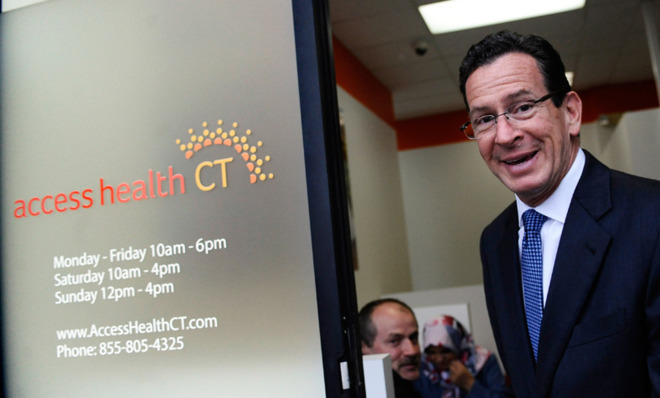These Democratic governors are trying to save ObamaCare
Or at least they're not joining their congressional counterparts by freaking out over the ObamaCare disaster


A free daily email with the biggest news stories of the day – and the best features from TheWeek.com
You are now subscribed
Your newsletter sign-up was successful
Vulnerable congressional Democrats have been spooked into breaking ranks over ObamaCare, joining Republicans in criticizing the administration's botched rollout and pressing for legislative fixes to the law's lingering problems.
Yet away from D.C., some Democratic governors are doing the opposite. Seeking to shore up support behind the president, they're defending the troubled health care law by touting its lesser-known successes in their states.
A trio of Democratic governors — Washington's Jay Inslee, Connecticut's Dan Malloy, and Kentucky's Steve Beshear — wrote in a Washington Post op-ed Sunday that ObamaCare was working in their states because politicians there "grasped the importance of expanding health-care coverage and have avoided the temptation to use health-care reform as a political football." All three states built their own insurance exchange websites, and all three also signed on to the federal expansion of Medicaid.
The Week
Escape your echo chamber. Get the facts behind the news, plus analysis from multiple perspectives.

Sign up for The Week's Free Newsletters
From our morning news briefing to a weekly Good News Newsletter, get the best of The Week delivered directly to your inbox.
From our morning news briefing to a weekly Good News Newsletter, get the best of The Week delivered directly to your inbox.
States were not required to do either. Thirty-six states opted not to design their own exchange sites — forcing the federal government to pick up the slack — and many Republican-controlled state governments declined the Medicaid expansion, leaving thousands of lower-income people without access to more affordable insurance.
The federal government completely screwed up the Healthcare.gov launch, and the website may still be broken come the administration's self-imposed end-of-month deadline to have it fixed. But states that built their own marketplaces have had comparative success in getting their residents insured; about three-quarters of all ObamaCare enrollees signed up via state marketplaces.
Though the state-level operations haven't been flawless either, they are more tailored to users' needs. And due to their smaller size, they're more "adaptable," Alan R. Weil of the National Academy for State Health Policy told the New York Times, allowing state officials to "respond more quickly to solve problems as they arise."
Kentucky, Connecticut, and Washington boasted three of the top five enrollment figures as a percentage of their potential market pools in October. And despite all the public outrage over the federal bungling, more than eight in ten participants in Connecticut's operation, Access Health CT, said they were "extremely" or "very" likely to recommend it to their friends and peers.
A free daily email with the biggest news stories of the day – and the best features from TheWeek.com
As for Medicaid, it has been the brightest spot for ObamaCare in what has otherwise been a dismal past six weeks. While only 106,000 people enrolled in private health insurance plans in October, nearly 300,000 newly eligible people enrolled in Medicaid.
The Post op-ed, though acknowledging that the ObamaCare debut has been underwhelming, suggested that it would have been far more impressive had it not been hampered by Republican efforts to undermine it. And the crux of the governors' argument — that ObamaCare can work and is, in some ways, working — could serve as a rallying cry for congressional Democrats to not peel away from the White House in greater numbers.
On Friday, 39 House Democrats joined Republicans in passing a bill drafted by Rep. Fred Upton (R-Mich.) that would allow insurers to keep offering existing plans that would otherwise be deemed insufficient under ObamaCare's tighter standards for coverage — even though the bill is widely seen as a poison pill aimed at destroying the law. With squishy Senate Democrats still pushing their own legislative remedy despite Obama's announced administrative fix, the intra-party division could widen.
Obama, facing those potential defections, could certainly use all the support he can get from Democrats unafraid to publicly praise the law's successes. With midterm elections right around the corner, though, it's perhaps not too surprising that he's finding more vocal support from party members outside Washington than from those within it.
Jon Terbush is an associate editor at TheWeek.com covering politics, sports, and other things he finds interesting. He has previously written for Talking Points Memo, Raw Story, and Business Insider.
